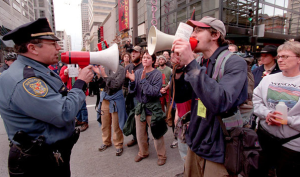
“What a prize herd of sheep! They stand here in shoes made by shoeless Malaysians, wearing goose-down coats assembled in the frigid climes of Honduras, slurping down overpriced espresso from Africa, and they proceed to lecture the world on world trade. And they are the alternative. You can have everything in the world super-cheap, or you can submit yourself to the dictatorship of the stooges. Some choice!”
November 30, 1999
“Eat the rich!” the Class Clown shouted at the fringes of the protest. “Eat the rich today! Cook ’em up hot with Brazilian charcoal on a Chinese hibachi!”
These were jokes, if you have to be told. He was in Seattle, a humorless place on its best day. And this was its worst day, the opening day of the World Trade Organization talks. The city was infested with Concerned Protesters, the most stolidly humorless species ever identified.
I met the Class Clown a few years ago at a massacre outside a high school. He’s taller now, and thinner, and his clothes are even baggier. He’s unpierced, amazingly enough, at least so far as I could see.
“Make noise, not sense!” he chanted. “Make noise, not sense! If you have nothing to say, say it LOUD!”
I caught his eye from across the mob and nodded to him. He recognized me and winked, continuing to chant. Some of the protesters around him took up the chant — “Make noise, not sense! Make noise, not sense!” — and marched off to infect others.
I threaded my way over to him and he laughed out loud. “Like shooting fish in a barrel,” he said.
“I, uh… I think I might have foreseen better things for you…”
“Relax. I’m at Stanford. I’m just up here to goof on these goofballs.”
I smiled. “Your compassion is undiminished.”
“A while ago I went up to this gaggle of girls, very serious, very militant. I stumbled up to them, coughing and wheezing, and said, ‘The teargas! cough-cough It’s made… choke-choke In Korea!’ Man, I thought they were going to wet their pants!” He laughed hard from the throat.
“I mean,” he went on, “what a prize herd of sheep! They stand here in shoes made by shoeless Malaysians, wearing goose-down coats assembled in the frigid climes of Honduras, slurping down overpriced espresso from Africa, and they proceed to lecture the world on world trade. And they are the alternative. You can have everything in the world super-cheap, or you can submit yourself to the dictatorship of the stooges. Some choice!”
“Stooges?” I asked. My job is simple. I wind ’em up, and I turn ’em loose. That’s my contribution to the global economy.
“Stooges,” the Class Clown replied. “These morons don’t know why they’re here. ‘Make noise, not sense!’ — it’s not a joke, it’s a strategy. They’re sheep bleating what they’ve been taught to bleat — environment, poverty, globalcorporatefascistgreed. What are they actually protesting? Only a very few of them know, and they’re not talking. But it’s obvious as soon as you think about it. They’re not protesting global trade, they’re protesting the result of global trade: The global shortage of communists.”
I must have winced, because he said. “No. Wait. Just think. What is the greatest enemy communism has ever known? Ronald Reagan? The Star Wars missile shield? Televised interviews with political prisoners? Massacres at Red Square and Tianamen Square? None of that. The greatest enemy of communism, the thing that is killing it dead forever, goes under dozens of names, but it is known to Americans by four little symbols: ‘401k.’”
He laughed again. “Stockholders of the world, unite!” he shouted. “You have nothing to lose but your investments!” To me he said, “It’s not just the stockholders, of course, although practically everyone in America is a stockholder now. But even the poor have it knocked. Five years ago, you could walk into a K-Mart, lay down a hundred dollars and walk out with a 10-speed mountain bike. Today it’s a 21-speed bike with top-quality Japanese brakes and gears — and the price is eighty dollars. Not just a better bike, a much better bike, for twenty dollars less.
“And it’s the same for the shoeless Malaysians. Their children have to work beside them, boo hoo, but those are children who would have died in infancy without the wealth provided by the shoe factory. Everyone in the world is richer, and, for once in the history of the world, almost everyone in the world knows why. Without stupid trade restrictions, we can’t create human misery. And without human misery, we can’t create communists. We have to do something to stem this global communist shortage.” He gestured at the milling protesters. “Voila!
“Still, it’s funny. Can you imagine being dumb enough to protest trade in a city crawling with stock-option millionaires? How do you get a Seattle Yuppie to work as hard as a Malaysian? You say, ‘pre-IPO.’” He laughed and I joined him.
“You want to see this?” the Class Clown asked. “I’ll show you how it’s done. ‘Better clothing, cheaper shoes, global trade is bad for you!’ Like that. ‘Safer cars, cleaner food, global trade is bad for you!’”
The protesters nearby picked up on the refrain and shouted it back to him with enthusiasm.
He called: “Precious metals, priceless jewels!”
And they responded: “Global trade is bad for you!”
“Faster computers, stickier glue!”
“Global trade is bad for you!”
“More for me, more for you!”
“Global trade is bad for you!”
The Class Clown winked at me very broadly and called out: “Two legs bad, four legs good!”
And his sheep very proudly bleated: “Global trade is bad for you!”
I left him there. He was having his own fun, and, besides, I wanted to watch people protest global trade by looting Japanese televisions…















